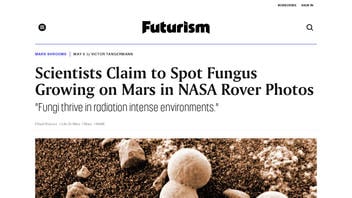STORY UPDATED: check for updates below.

Did scientists spot fungi growing on the surface of Mars? No, that's not true: Mars does not have all the capabilities to support plant life. According to a NASA spokesperson, the pictures are actually from the 2003 Opportunity mission and show mineral formations. Scientists relied on chemical, visual and mineral information to authenticate the shapes are minerals and not a fungus.
The story appeared in an article published on futurism.com on May 6, 2021 titled "Scientists Claim to Spot Fungus Growing on Mars in NASA Rover Photos" (archived here) which opened:
"The hunt for life on Mars continues, with NASA's latest rover Perseverance using its scientific instrumentation to scan the Jezero Crater, an area believed to be a dried up ancient lake, for any signs of ancient microbial life."
Users on social media only saw this title, description and thumbnail:
Scientists Claim to Spot Fungus Growing on Mars in NASA Rover Photos
"Given the likelihood Earth has been seeding Mars with life and life has been repeatedly transferred between worlds, it would be surprising if there was no life on Mars."
Lead Stories emailed the Jet Propulsion Laboratory (JPL) on May 10, 2021, for a comment on this claim. Andrew Good, JPL Media Relations spokesperson, responded to our email:
Needless to say, no, this is not evidence of fungi on Mars. The images that are being posted are from the Opportunity rover, which discovered mineral spherules that were nicknamed 'blueberries' based on their size and shape. Scientists didn't rely solely on visual information to identify them; they used instruments on the rover to measure chemical and mineral information within these spheurles (sic), confirming they were in fact minerals that formed in the presence of water.
The blueberries are one of the best-known discoveries of the Opportunity mission, something countless Mars scientists from around the world would be familiar with and have studied the data for.
Furthermore, the authors ignore other data that easily disprove their claims; for example, many features claimed to be biological are known to typical martian rocks, sand, dust, and ice that change in appearance due to weather, lighting, or rover interactions. Other features superficially resemble fungi but actually are commonly observed, abiotic features in rocks that occur from geochemical changes or by erosion from wind.
The paper that was the original source of the claim was published in Advances in Microbiology in May 2021.
Lead Stories also reached out to a mycologist -- a scientist who studies fungi -- for comment on this claim. Richard Silber, a member of the Mycological Association of Washington, D.C., responded on May 10, 2021:
No mycologist signed on to this report. With no oxygen or water available, the likelihood of mushrooms growing on Mars seems highly unlikely.
Updates:
-
2021-05-12T19:33:02Z 2021-05-12T19:33:02Z Updated to remove a Jet Propulsion Lab spokesperson's characterizations of CNET and Journal of Cosmology.

















